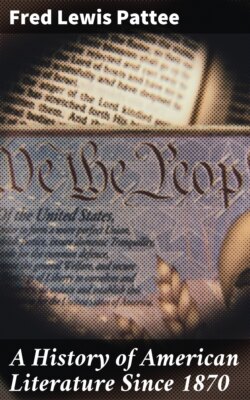Читать книгу A History of American Literature Since 1870 - Fred Lewis Pattee - Страница 13
На сайте Литреса книга снята с продажи.
I
ОглавлениеTable of Contents
In a broad way the school was a product of the Civil War. American humor had been an evolution of slow growth, and the war precipitated it. The election of Lincoln in 1860 was the beginning. Here was a man of the new West who had worked on flatboats on the Ohio, who had served as a soldier in a backwoods troop, who had ridden for years on a Western circuit, and in rough and ready political campaigns had withstood the heckling of men who had fought barehanded with the frontier and had won. The saddest man in American history, he stands as one of the greatest of American humorists. His laughter rings through the whole period of the war, man of sorrows though he was, and it was the Western laughter heard until now only along the great rivers and the frontier and the gold coast of the Pacific. He had learned it from contact with elemental men, men who passed for precisely what they were, men who were measured solely by the iron rule of what they could do; self-reliant men, healthy, huge-bodied, deep-lunged men to whom life was a joy. The humor that he brought to the East was nothing new in America, but the significant thing is that for the first time it was placed in the limelight. A peculiar combination it was, half shrewd wisdom, "hoss sense," as "Josh Billings" called it, the rest characterization which exposed as with a knife-cut the inner life as well as the outer, whimsical overstatement and understatement, droll incongruities told with all seriousness, and an irreverence born of the all-leveling democracy of the frontier.
"It was Lincoln's opinion that the finest wit and humor, the best jokes and anecdotes, emanated from the lower orders of the country people,"[15] and in this judgment he pointed out the very heart of the new literature that was germinating about him. Such life is genuine; it rests upon the foundations of nature itself. Lincoln, like the man of the new West that he was, delighted not so much in books as in actual contact with life. "Riding the circuit for many years and stopping at country taverns where were gathered the lawyers, jurymen, witnesses, and clients, they would sit up all night narrating to each other their life adventures; and the things which happened to an original people, in a new country, surrounded by novel conditions, and told with the descriptive power and exaggeration which characterized such men, supplied him with an exhaustless fund of anecdotes which could be made applicable for enforcing or refuting an argument better than all the invented stories of the world."[16]
It was the new humor of the West for the first time shown to the whole world. Lincoln, the man of the West, had met the polished East in the person of Douglas and had triumphed through very genuineness, and now he stood in the limelight of the Presidency, transacting the nation's business with anecdotes from the frontier circuits, meeting hostile critics with shrewd border philosophy, and reading aloud with unction, while battles were raging or election returns were in doubt, from "Artemus Ward," or "Petroleum Vesuvius Nasby," or The Flush Times of Alabama and Mississippi—favorites of his because they too were genuine, excerpts not from books but from life itself.
